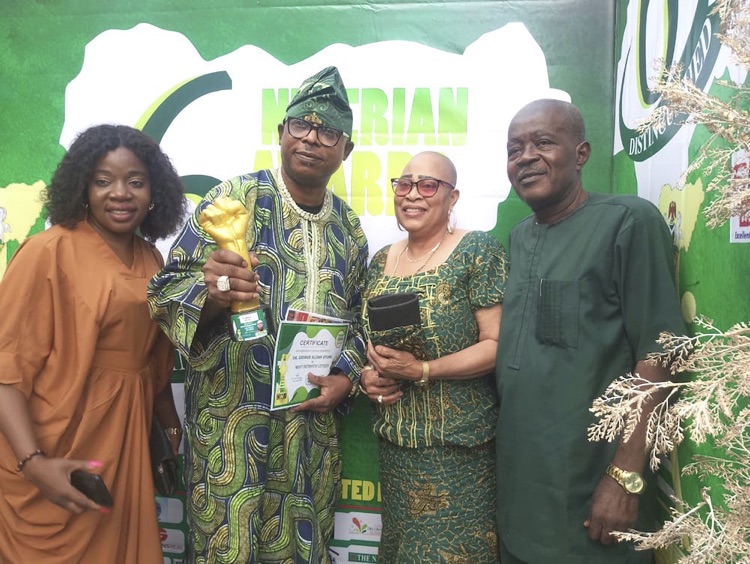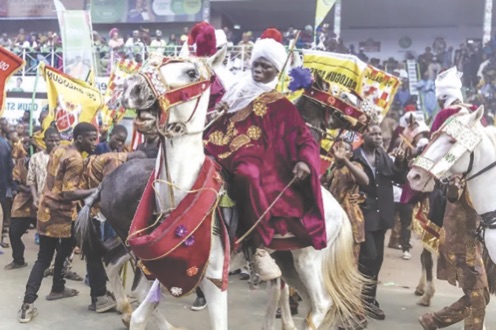By Henry Akubuiro
Chigozie Obioma rose to global prominence with his debut novel, The Fishermen (2015), and the second, An Orchestra of Minorities (2019), two works that were finalists for Booker Prize. His latest work, The Road to the Country, was published in 2024, and has been trailed with global acclaim. With over 40 translations, his debut novel has been hailed as one of the most successful fiction debuts in recent years. He is Helen S. Lanier Professor of Creative Writing and English at the University of Georgia and the programme director of the Oxbelly Fiction Writers retreat in Greece. In this interview with Daily Sun, Obioma bared his mind on the motivation for creating a narrative on the Nigerian civil war and his fascination with the earth and the external world. “I think my interests lie in the liminal, that space between the physical and the metaphysical,” he says.
Do you share the view that the Biafran war is underexplored in fiction? Some critics say the subject is overflogged, having been feasted on by a number of authors since 1970 the war ended.
Thank you for speaking with me. I believe that this question is more complicated than it appears. Has there been much written about the war? Certainly yes—maybe not enough, but definitely a lot. The question then is, what kind of books have been written about the war and what kind hasn’t been written? It would surprise you to find that of the many books written about the war, most of them are memoirs, biographies, history books, dissertations, papers, journalistic accounts—simply, a trove of non-fiction. Then, there are some work of fiction, but they are you primarily what I now call “War-time fiction.” This is fiction in which the war is in the background, rather than frontal. It is concerned mostly about civilians living through the war. It rarely depicts the fighting. There are very few war novels—that is, fiction in which the war is central, and follows the men and women fighting into the trenches. Most of the ones that were written are long out of print and never really had a wide audience. The only exception I can think of, to a large extent, is Sozaboy by Ken Saro-Wiwa. I wanted to fill that gap as I think there is a need for a work of fiction that depicts the realities of the war in an unflinching gaze so that those of our generation who did not experience it can try to make sense of it and understand the true gravity of the war. This is why The Road to the Country, I believe, fills a gap in the canon about the war.
You hinted in the Author’s Note that the Biafran war is a story you always have wanted to write, where does the hunger come from? What departures did you bring to the tapestry of the narrative?
I have always known that I would write about this war from a long time ago, perhaps from when I was only a boy. It just really was this event that was seared into my consciousness mostly by an encounter in 1993. I was only six years old when Nigeria erupted that year due to the annulment of the presidential elections won by Chief MKO Abiola. The immediate result was a riot and a group of people trying to protest the action by the Nigerian junta. My family, as most Igbo families, felt safer in the East, so we set out for the East. Once we got to the village, my first time there, I was faced with the sad specter of many people with physical deformities—a man without limbs who was on a wheelchair; another woman with just one arm; and a young woman with half her face eaten up what I would later discover was cancrum oris, a rare disease spurred by the war. Naturally, I became deeply curious about the war and began reading whatever I could find about it, and knew over the years that I wanted to write a novel about it at some point.
So, over the years, I read so much and heard so much from people who had experienced the war in one form or the other. Of course, there have been documentaries, memoirs, historical accounts etc. I also read books about other wars to get a sense of what it meant to be a frontline soldier in a war. I even ventured to ask an active Nigerian soldier fighting the Boko Haram insurgents in the north of Nigeria what it felt like for which I was in danger—in this piece I wrote for the Financial Times. So, for me, even though the material is familiar as all histories are, the story itself is fresh. For one, the story is told through the lens of a visionary who has a vision about the war while still living in 1948, pre-independence Nigeria. As such, the story carries the reader into a present that is in fact the future, and into a past that is in fact the present. By such doing, the novel invents a narrative structure while still telling the human story of a Yoruba man caught in the naked webs of a war that was not fully his own to fight.
Kunle enjoys a remarkable prominence in the novel, first as an adventurer to Biafra in search of a missing brother and, then, as a fighter renamed Nwaigbo by the conscriptors. In creating Kunle, what was at the back of your mind, bearing in mind he had a Yoruba name and was born in Akure?
Kunle is loosely based on a real person who lived in my neighborhood in Akure in the 1990s. He had himself been dragged into the war to fight on the side of the Biafrans. When I began writing the book, I worried that simply telling such a detailed depiction of the war might cause some people to view me as memorializing the war from the perspective of ethnic sentimentality, since I am Igbo and therefore from the defunct Biafran nation state. So, I thought starting from Akure, a place I grew up in and consider home as well, was going to serve me better. Plus, I wanted someone who would fight in the war without being emotionally or ideologically attached to the cause itself. Kunle seemed like the best vehicle for that character.
The Seer is a resonant voice in this fiction, why is it so? What’s the connection between fortune telling and the African reality vis vis its deployment in the novel?
Igbala Oludamisi, the seer, is probably one of the hardest characters I have ever created, but one of the most delightful, too. He is the canvass through which I am able to expand the novel beyond the simple, linear-structured novel. He is a prophet, and I feel that the prophetic is a realm that is very much familiar to me as someone who grew up in the cultures—the Igbo, Yoruba, and Christian—I grew up in, all of which believe and effectively promote the prophetic. But he is also a resource to enable the creation of a narrative that, while known history, feels in the end like something simply thought-up and not yet fulfilled.
Also, you have continued to stick to African myths, culture, mysticism, and the intersection between the living and the dead. What’s the thinking behind this?
First, I believe that we all write from a place of varying existential pressures–or, at least, I write from that. This is why I think my interests lie in the liminal, that space between the physical and the metaphysical. The prophetic, which by nature, embodies the unknown and the mysterious, is a veritable creature of that space. It is a space that allows me to create characters and events that are mystical rather than magical without breaking with the real. I call it mystical realism. Consider that there is no magical occurrence in The Fishermen, yet you feel the sense that the novel is walking in that metaphysical space. An Orchestra of Minorities is much the same: the chi exists in another dimension of consciousness, and Chinonso is not privy to it. So, whatever the chi does is in a different realm. We can explain Chinonso’s activities and actions and existence on purely realistic terms. The Road to the Country takes this trope even further. The entire novel takes place in 1947, yet we spend 95% of it during the Biafran War of Independence (1967-1970). Second, I think that I am drawn to the ways the Igbo and Yoruba people (two traditions that shaped my understanding of storytelling) told stories in the past. I feel that in the worldview of say the Igbo, a story often has some spiritual import. That is why they feel mythic. I am merely working in this same mode. There is a story, a journey, and an infusion of spirituality.
The love thread in The Road to the Country appears to be overshadowed by the consequences of violence, did you regret it didn’t occupy the front burner of discourse around the work?
I think this is a novel that will rise with time. It may be too detailed in its memorialization of the troubled past and violence to generate the kind of scrutiny that I feel it should generate, though I am of course perhaps biased. So, I am not surprised that the reviews I have seen—and there are only a few I have read—seem to mostly frontload the historical arc of the story and largely overlook the personal story, which in fact is what gives Kunle’s journey its propulsion.
What’s your fascination with Akure? It appears repeatedly in your fiction.
It’s the place where I was born, where my narrative lens was first acquired, and where I simply find it easiest to conceptualize in fiction.
You have been accused of an undesirable tragic ending in The Road to the Country, could you have done better with a happy ending?
Well, this is a novel with two endings: the first being the ending to Kunle’s experience in the war and the narrative future, and the other ending, which is the end of Igbala’s trance. The former may be considered tragic because Kunle’s girlfriend, Agnes, does not return and is not accounted for. However, I chose to see the birth of his child as a happy ending, given that, being a soldier, Agnes was always in danger of the realized death. Igbala’s rendering of his vision is sobering, not tragic, as it points to a disaster that could have been averted and not stopped.
Uwem Akpan recently accused Achebe and Chimamanda, two prominent Igbo novelists, and, by extension you, since you wrote on Biafra from the losers’ point of the Igbo, of forgetting the Igbo excesses against minorities in their narratives, how justified is that accusation?
I think his point is interesting, if a bit misguided. That Achebe and Adichie both wrote about the war from the Igbo perspective doesn’t preclude him from writing one from the perspective of the Efik/Ibibio and other Niger-Delta groups. That said, my novel covers all these grounds, including his interests in the representation of the Igbo marginalization of ethnic minorities within the Biafran state.
Your debut novel, The Fisherman, broke barriers. Can you tell us about the amazing journeys of this work?
The Fishermen was my debut novel and it surpassed my expectations. It was first composed in 2009, in essentially one night, then expanded over a period of, I think, six years. It was inspired by my own upbringing and family setup in 1990s Nigeria. It has won half a number of prizes and been finalist for the Booker Prize, as well as about twenty others, and is now available in close to 40 countries. So, I am very humbled by all that. For me, it was that bird that flew out of nowhere—really nowhere.
Tell us about your recent preoccupations outside writing fiction.
My family: I have a partner and children. I spend time with them and love being a Dad. I also, obviously, love reading more than I love writing. The book I return to more often than most is the Bible. It is a living, spiritual book, and I find that the words jump out and lodge into me each time I read it and I am transformed by each encounter with it.
The post Chigozie Obioma: No contemporary writer has depicted Biafran war like me appeared first on The Sun Nigeria.




